We began our ministry in Haiti in 1968 with the Child Sponsorship Program. In 2003, we started the Survival Program for babies and their caregivers.
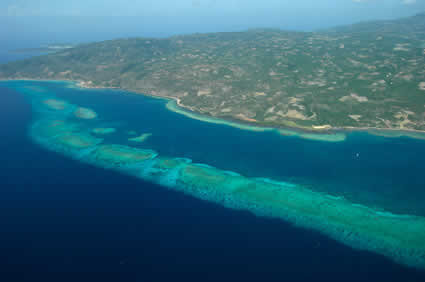
In 2008, we celebrated our 40th anniversary in Haiti. During 40 years of ministry, we have transformed school projects into child development centers. We have also networked with other nongovernmental organizations in Haiti and have raised awareness within the church and community about the need to be involved in issues affecting children.
Country Director
In 1997, Guilbaud Saint-Cyr joined the ministry in Haiti as a program facilitator and became the operations coordinator in 1999. He was appointed country director in 2003. Before coming to our ministry, Guilbaud was a certified public accountant and the founder of the accounting firm COGEFISC Plus, which promotes financial integrity and accountability within various nongovernmental organizations and private businesses.

Guilbaud taught management in various vocational institutions and helped launch several child advocacy agencies, including ROCHEPE, a Christian organization for child development. He serves as president of the Evangelical Press Council, is a board member of the Micah Challenge and currently serves as a Sunday school teacher and itinerant preacher.
Holding a bachelor of arts degree in business management and a bachelor of science degree in accounting from the State University of Haiti, Port-au-Prince, Guilbaud also has a diploma in Advanced Leadership from Haggai Institute of Singapore and a diploma in Micro-enterprise Management. He is currently pursuing a master’s degree in organizational leadership from Azusa Pacific University, California.
Implementing Church Partners
Implementing Church Partners are local churches in Haiti with whom we work to deliver child development programs and ministry in the field.
- Spiritual Climate
The influence of Voodoo is still strong in Haiti. Christian leaders live in constant spiritual warfare. Churches are growing numerically, but not necessarily in terms of spiritual growth because of the combining of the Christian faith with Voodoo and other cultural influences. - Unique Challenges
One challenge unique for implementing church partners in Haiti is how to set up their budgets in order to address children’s need for formal schooling. In Haiti, 5 percent of schools are public and 95 percent are private, meaning the cost of schooling is higher.Another challenge for church partners is sanitation. Often the church infrastructure is not sound. Also, the government does not provide health services. Therefore, we are obliged to use about 20 percent of sponsorship funds for health and the physical aspect of development in the Child Sponsorship Program and 30 percent for the Child Survival Program. - Contributions
Implementing church partners take care of the facilities and the maintenance of the buildings. They are responsible for the construction costs for any needed facilities. They also contribute to the health care of children from the elementary schools associated with the child development centers.Some denominations in the southern and northern areas of Haiti and the city of La Gonave have medical centers, which provide health care for children in need. - Partner Development Activities
Compassion Haiti develops partners through training, regional conferences, facilitation, and networking.
Survival Program
-
- Caregiver Literacy
Through the Survival Program, we evaluate the literacy level of the mothers. In response to this, we establish each mother in an implementing church partner literacy class.These classes include writing, reading and simple math skills. The classes are held twice a week.
- Caregiver Literacy
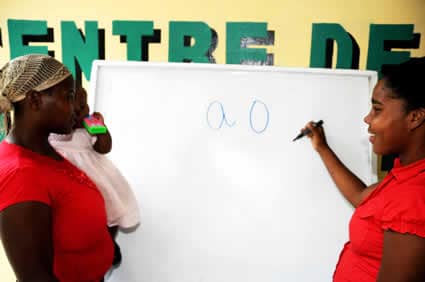
-
- Income-Generating Skills
Generally, we organize sewing, cooking, and craft classes for mothers twice a week for two hours. - Health Care
For the prenatal period, mothers go to the hospital for a consultation and laboratory tests. Twice a year, each child development center organizes a mobile medical clinic with a pediatrician, an internist and a medical practitioner or an obstetric doctor. Most of the mothers deliver at a small local hospital.For special health cases, we recommend them to a specialized medical center. The child development center staff covers the expense, and then the Compassion office reimburses 80 percent of the expense on a monthly basis.For immunization, children receive some vaccines from the State Health Department for free. But other vaccines, such as hepatitis B, typhoid, pneumonia 23, and meningitis, are provided by us, as they are expensive but crucial for safe child development.For health screening, we have a health implementer who received training from the Child Survival Program specialist and from the State Health Department. The health implementer is responsible for monthly health screenings and submits reports to the Survival Program specialist for appropriate follow-up.
- Income-Generating Skills
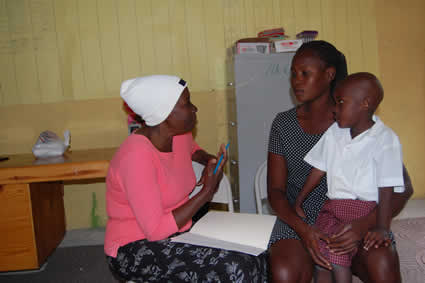
-
- Nutritional Support
Once a month, each mother receives a dry food kit containing rice, beans, sugar, milk, oil, spaghetti, etc. Most of these moms live in a family of at least seven people, so this kit only lasts for two days.Because of this we have established income-generating activities for 20 Child Survival Programs in order to help provide food to these families and help them become economically self-supporting.
- Nutritional Support
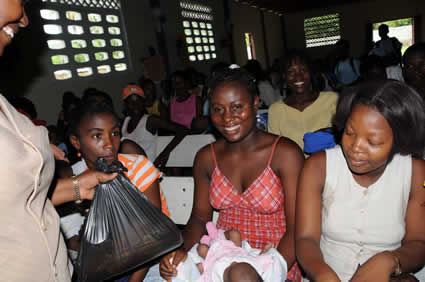
- Involvement of Fathers
In general, fathers participate in the graduation ceremony, training on family planning, annual spiritual retreats and birthday celebrations. In some cases, if the mother isn’t available to participate in regular activities, the fathers will attend meetings. - Transitioning Out of the Survival Program
Implementing church partners evaluate the development of each child based on the four areas and indicators of the Survival Program manual. This information is submitted in a report to the Survival Program specialist for appropriate follow-up.Based on this evaluation and on one year of accomplishment in the program, we decide whether or not they will graduate. Then, the Survival Program implementer fills out the appropriate form and sends it to our office for follow-up. After this, the mothers and children participate in a graduation ceremony. - Areas of Expansion for the Survival Program
We will open additional Survival Programs throughout areas of Haiti that are more prone to flooding, hurricanes and earthquakes. Also, children in these areas are vulnerable to potentially fatal but preventable diseases, such as malaria, typhoid, diarrhea, intestinal parasites and tuberculosis.
Child Sponsorship Program
Your sponsorship of a child in Haiti provides a variety of benefits.
- Meeting Times
The child development program schedule depends on the needs for each particular center. Below is a typical schedule for the child development centers in Haiti.- 3 to 5 year olds: 1 hour a day, from Monday through Friday, and 3 hours on Saturday
- 6 to 8 year olds: 2 to 4 hours after school and 4 hours on Saturday, adding up to 6 to 8 hours a week
- 9 to 11 year olds: 2 to 4 hours after school, and 4 hours on Saturday, adding up to 6 to 8 hours a week
- 12 to 14 year olds: 2 to 4 hours after school, and 4 hours on Saturday, adding up to 6 to 8 hours a week
- 15 to 18 year olds: 2 to 4 hours after school, and 4 hours on Saturday, adding up to 6 to 8 hours a week
- 19 +: 2 to 4 hours after school, and 4 hours on Saturday, adding up to 6 to 8 hours a week
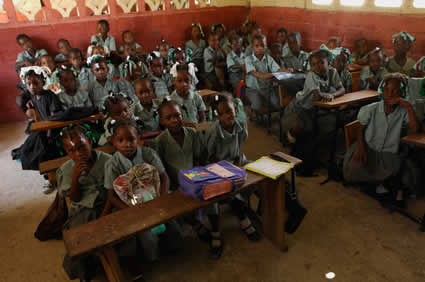
- Nutritional Support
When attending child development center activities, each child receives a snack, such as sandwiches and juice or milk, during the week, or a hot meal, which consists of spaghetti or rice, beans, vegetables, meat and juice.Often, children come to the center without having eaten, so we feed them to help them learn well. Some centers provide hot food during weekly activities, some don’t. That depends on the financial capacity of the each center. We have a special nutritional approach for malnourished and the neediest children. - Vaccinations
We make sure that each child benefits from basic vaccines given by the State Health Department. Unfortunately, the implementing church partners can’t afford all of the expensive vaccines for the children, such as hepatitis, typhoid and meningitis. - Extracurricular Activities or Community Service
There is a special program held during the summer in which groups of children from different centers participate in a knowledge competition. We hold spiritual retreats during Carnival and Easter time.We also have spiritual decision day on special occasions and have musical bands perform for the children at special events, such as graduations, funerals, etc. - Vocational Activities
Student clubs are held each Saturday from 9 to 12 or 1 to 5 p.m. Vocational activities available are based on the local child development center. These activities can include painting, crafts, sewing, computer, music, photography, videography, cooking, foreign language classes, etc.The choice of programming for adolescents depends on the resources available in the community and in the interest of the children.
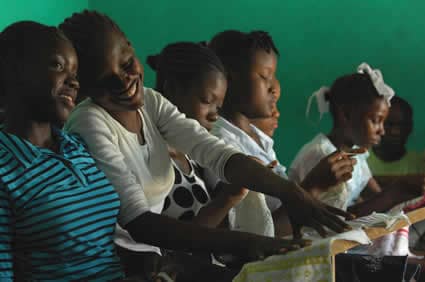
- Child Sponsorship Program Alumni Activities
The alumni group has existed since August 2000. Members are involved in our ministry doing things such as talent shows, knowledge competitions and art contests. They also help with disaster recovery, regional training and conferences.Many alumni helped in the disaster recovery process in Haiti after hurricanes and after the January 2010 earthquake.Compassion center staff and volunteers provided disaster relief including food and hygiene kits after the August 2021 earthquake. - Parent Involvement
Once a week we have parenting classes, parents’ club, and income-generating activities for the neediest parents. - Areas of Expansion for Child Sponsorship Program
We would like to expand in the northern, western, southern, and central plateau areas of Haiti. These are the neediest areas and we have many potential partners in these regions.
Complementary Interventions
Our core Child Sponsorship Program, while comprehensive, does not address all obstacles to a child’s healthy development. Complementary interventions provide additional services, such as our AIDS Initiative, Bibles for all children, disaster relief and water projects.
Some of the complementary interventions we offer in Haiti are:
- Education
Nonformal education, vocational training for the Child Sponsorship Program and youth development activities - Health
Educational sanitary training, health care and prevention, and water wells purification and treatment - Recapitalization
Micro-credit, small retail trade, pig or goat distribution, and hen houses - Infrastructure
Computer laboratory centers, osmosis inverse water system, school buildings and latrines
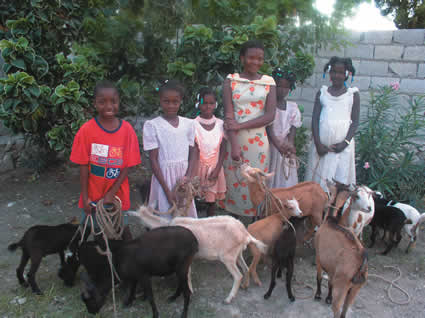
Highly Vulnerable Children
In our context, we have educational and vocational training for the needs of highly vulnerable children. In order to meet these needs in a sustainable manner, we intend to create a semi-industrial center where the children can learn to produce goods for the market and we will find new markets for them.


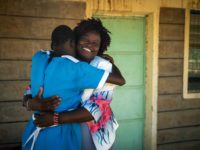




6 Comments |Add a comment
Great article. Having concentrated on sponsoring in only one country ( 4 children in Honduras) we made an effort to reach out to Haiti this year. Great to have information and better understanding.
So glad to hear the many ways CI is supporting the children in Haiti and their families. I, too, have a correspondent child there but because of letters coming only 3X a year from Haiti, I know very little about her life there. Thanks for helping fill in some of the gaps about services that may be available to her and her family and what some of her challenges may be.
Wow, this was a really great, informative post!! I have a correspondent child in Haiti and have been waiting for the Ministry Highlight there. Nice job!
Thanks you for all the great info. I have sponsored 2 children and an LDP student from Haiti. I now keep up with my “graduated” LDP student via Facebook who I originally thought had perished in the earthquake. Years ago Compassion was the catalyst for my family’s first learning about and God giving us a burden for the people of Haiti. Today, we have 2 little sisters that we adopted from Haiti who came home 1 month after the quake! Compassion has truly impacted and changed our lives regarding Haiti!…..Your impact goes farther than you know!
This was the best conclusive info I have read on sponsorship on a country. Love these, want more!
Shannon Meade, Advocate
Thank you for that feedback Shannon!! We are doing a Ministry Highlight every Friday until each Compassion country has been reported on. It is good to know that these post are helpful and wanted!